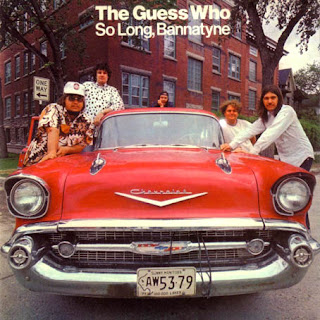Jan Hammer Group
Oh, Yeah?
1976
Nemperor Records
Mahavishnu Orchestra's first (and arguably most prolific) incarnation came to a painful end in 1973, as a sudden rise in popularity and a series of calamitous recording failures suddenly turned the great Mahavishnu into less of what they originally were into more or less the John McLaughlin Group. The band's original lineup, however, was so bursting-at-the-seams with talent and skill that it's members couldn't help but go on to form formidable solo careers -- Billy Cobham would traverse the jazz fusion path himself with Spectrum in 1973, and Jan Hammer, after collaborating with fellow musician Jerry Goodman, debuted his own solo material with The First Seven Days in 1975.
The album was well-received, and showcased the excellent skill Hammer obviously had. He continued on with the jazz-fusion shtick until the 80's, where he found himself composing film and television scores for such programs as Miami Vice. For the time being however Hammer really got in the swing of things and, not but a year later, delivered the facetiously titled Oh, Yeah? in 1976.
It's common for musicians to take an album or two to really get going, and get going Hammer did. Oh, Yeah? is a romp through some of the most thought-provoking and challenging sides of the jazz rock genre, whether it be the thumping bass/timbale combination of 'Bambu Forest', the eclectic and insane callbacks to Mahavishnu on 'Twenty One', or the driving openers and closers, 'Magical Dog' and 'Red and Orange', respectively. Almost every single song has something different to say in their own right, such as the throwing in of drummer Tony Smith's soulful vocals on 'One To One'. Jan Hammer and his band utilize an almost proto-80s synth culture to design Oh, Yeah? to be a sort of generational bridge that sits on neither side of the waters. A culture clash it may be, but it's a good one. Jan Hammer himself is the main pioneer in this regard, and with his effective use of a gamut of different synthesizing and keyboard effects it's easy to see why his more progressive electronic leanings make a greater impact than the likes of new age artists like Jean Michel Jarre did.
Towering and powerful, Oh, Yeah? is a can't-miss album, not only of the jazz fusion genre but of 70's music in general. It is the definition of a passion-project and is justly the penultimate release of Hammer's career.
The album was well-received, and showcased the excellent skill Hammer obviously had. He continued on with the jazz-fusion shtick until the 80's, where he found himself composing film and television scores for such programs as Miami Vice. For the time being however Hammer really got in the swing of things and, not but a year later, delivered the facetiously titled Oh, Yeah? in 1976.
It's common for musicians to take an album or two to really get going, and get going Hammer did. Oh, Yeah? is a romp through some of the most thought-provoking and challenging sides of the jazz rock genre, whether it be the thumping bass/timbale combination of 'Bambu Forest', the eclectic and insane callbacks to Mahavishnu on 'Twenty One', or the driving openers and closers, 'Magical Dog' and 'Red and Orange', respectively. Almost every single song has something different to say in their own right, such as the throwing in of drummer Tony Smith's soulful vocals on 'One To One'. Jan Hammer and his band utilize an almost proto-80s synth culture to design Oh, Yeah? to be a sort of generational bridge that sits on neither side of the waters. A culture clash it may be, but it's a good one. Jan Hammer himself is the main pioneer in this regard, and with his effective use of a gamut of different synthesizing and keyboard effects it's easy to see why his more progressive electronic leanings make a greater impact than the likes of new age artists like Jean Michel Jarre did.
Towering and powerful, Oh, Yeah? is a can't-miss album, not only of the jazz fusion genre but of 70's music in general. It is the definition of a passion-project and is justly the penultimate release of Hammer's career.
2017 - The Frying Pan & Thatcher
Have a nice day!







